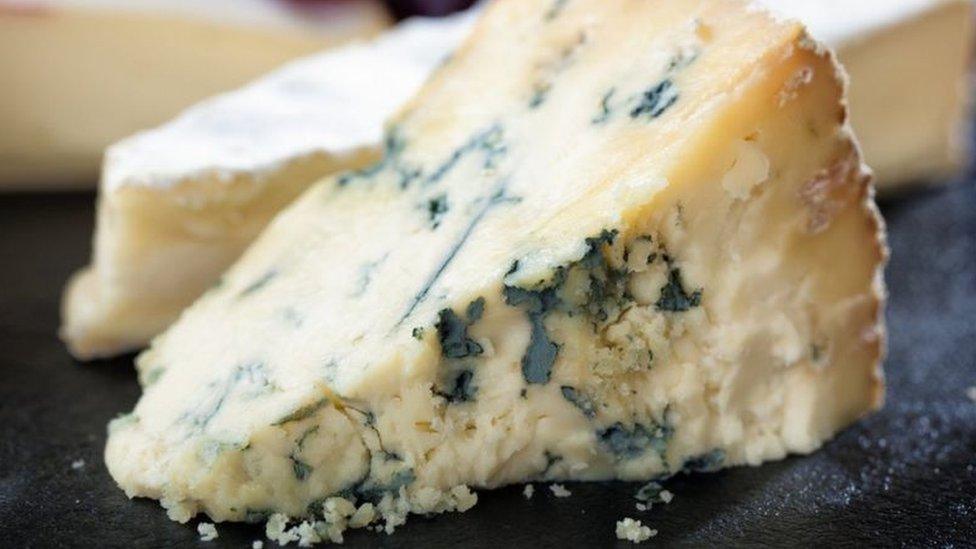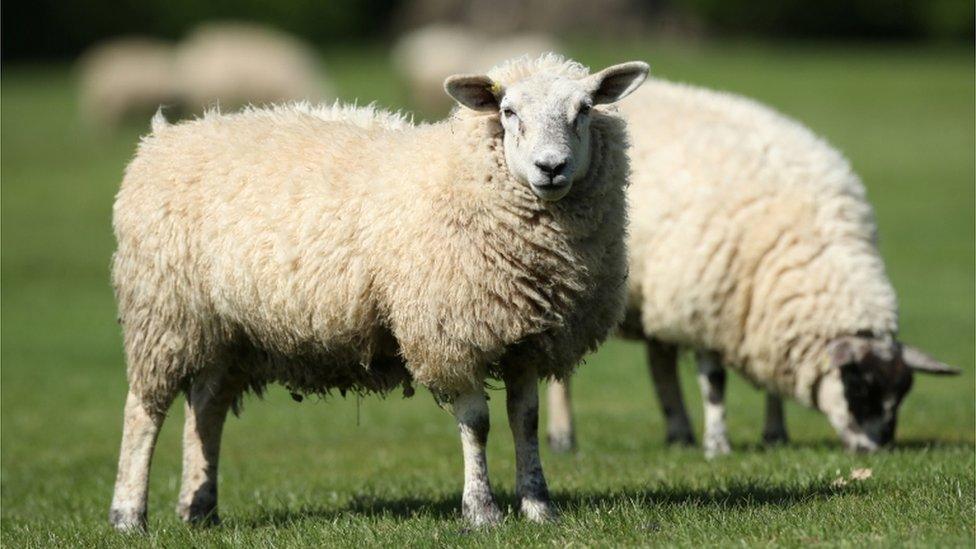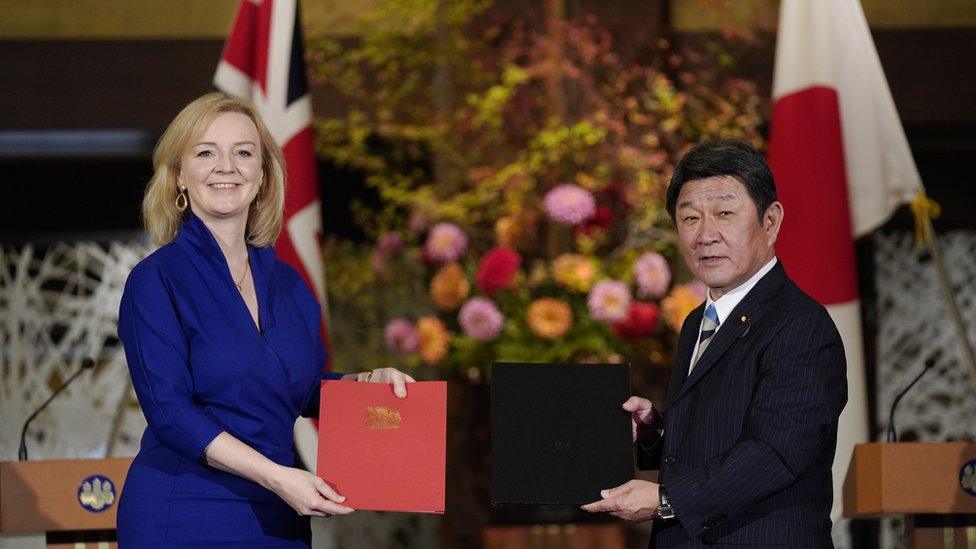Post-Brexit trade: Pricey wurst and cheesy leftovers
- Published

Talks nearly stalled on the question of exporting stilton cheese
"No deal" on Brexit would push up the price of exported food sharply, as well as imported European farm produce, according to academic research
The British food industry could switch to substitute for EU imports, or we could retrain our taste buds to native flavours, including a lot more herring
The bid to increase sales beyond Europe has started with a Japan free trade agreement, but the quota for cheese turns out to be the bit that EU exporters leave behind
Do you feel you have "a high heart and complete confidence", as you stride boldly towards an Australia-style future relationship with the European Union?
That's what Boris Johnson said the British had, as he prepared the UK for exiting the EU without an agreement on future trade relations.
Following the Australian example means trading with our nearest neighbours on the weakest of trade terms, and the highest of Europe's tariffs. So what would that mean for importers and exporters, and what will it cost you?
I was recently looking at seed potatoes, a big specialist export for Scottish farmers. With no deal on Brexit, there would be no exports allowed at all to the EU.
It could take many months to get the certification as a safe source of produce, even though that standard is currently being met. Once these can be exported, a seed spud would carry a tariff of 5%. A tattie for retail would be around 13%.
I then looked at other farm produce, some with much higher tariffs. The highest of all is for red meat, partly to protect our farmers, but outside the European Union, that protection turns against us.

The UK sold £356m-worth of sheep meat to the EU two years ago
A study by Scottish Agriculture Colleges found the UK sold £356m-worth of sheep meat to the EU two years ago. If we'd been outside the EU, that would have carried an average tariff of 48%. For butchered boneless lamb, it rises to 62%.
To avoid passing on that cost, British farmers could try to sell it more cheaply, but that would require cutting the price of the average kilo of lamb by 51%. And that's not going to happen. So don't expect any Scottish lambs or little piggies to be going to France's markets.
Another recent study, carried out at the London School of Economics (the LSE) - sponsored by food producer, Arla - found that, even with a Free Trade Agreement removing tariffs, the likely regulatory obstacles would still carry a significant cost. British agriculture would see exports to Europe drop 36% even with a deal, says the LSE, and without one, 69%.
Elastic scran
This study makes assumptions about how elastic demand is - meaning that some produce can rise in price, and people will still buy it, while some, like milk, is easily replaced by substituting from European farmers.
When you add together the tariffs, regulatory requirements for food and that elasticity, the LSE study says UK meat exports to the EU with a free trade agreement would drop 19%, and with "no deal" by 76%. On dairy, it would be down 96%. More than quarter of product lines would no longer be exported to the EU.
There would be higher costs coming the other way. In order to protect British farmers from more efficiently farmed and sometimes subsidised produce from other countries, in North and South America, Australia and New Zealand, there would be UK tariffs - an average of 18%. And without a deal, these tariffs would apply to European imports into the UK.
The LSE reckons on a 62% drop in food imports without a deal, and 23% less even if there is one.
The LSE study went on to look at prices. Inbound, EU cheeses such as feta from Greece, are forecast to go up in price 55% under "no deal": prosciutto ham and bratwurst up 32% with "no deal". They'd still rise in price 6% or 7% with a free trade agreement.
One thing you might expect is substitution. British producers switching production, given time and investment, to make more European styles of cheese or meat. Or we change our tastes to British produce, and eat even more cheddar.
That change of buying habits might have to apply to fish as well. Without a deal, if Europeans can no longer catch fish in British waters, then British crews can catch lots of fish for which there's not so much demand in Britain shops - not until we retrain our taste buds to eat more herring.
Extra toppings
But the UK could solve all this by doing deals with other countries. So goes the Brexiteer argument about a "global Britain". That's where the controversies kick in about potentially being required to adapt to America's food standards, which are incompatible with Europe's.
Britain could also find new markets for farm produce and the food processing sector, and on Friday, the UK signed its first free trade deal for nearly 50 years.
It's with Japan. This was negotiated at pace. It brings good news on reduced tariffs on shortbread and salmon. There is the dubious achievement of allowing pet food makers in Britain to export to Japan having sourced their contents from around the world - however offal they might be.

Liz Truss signed the deal with Japan's Foreign Minister Toshimitsu Motegi
In summer, the talks nearly stalled on the question of exporting stilton cheese. Trade secretary Liz Truss insisted there must be an opening of that market in Japan, with removal of its 30% tariff under WTO rules.
The deal, newly published, shows that she succeeded, but with a twist. The quota the UK has secured in cheese comprises the leftovers of the European Union's quota - after the EU's cheese exporters have taken whatever slice they can.
In some years, that quota is filled, so any British exports of Stilton would carry that 30% tariff. The Department of International Trade in London assures us that for the next few years, while they hope to negotiate a wider deal with Pacific nations, they expect there will be some leftover European quota for British exporters to take up.
There's also a "side letter" to the deal which gives the UK some extra cheesy toppings as assurances.
The problem is that every country has its domestic pressures. It's not just the UK government that has to show Brexit is delivering results: the Tokyo government had promised its dairy industry that the UK deal would not increase import quotas.
Sticky issues
Much of this is a reminder, while attention is taken by Covid-19, that "no deal" comes at a high cost, and not everyone has such a high heart and full confidence as the prime minister.
But the prospect of starting 2021 with no deal is looking lower this weekend than it did seven days ago. Back then, the door to negotiations was slammed shut, we were told. That looked, then and now, like negotiating bluster.
The two sides agreed a way to go into talks this week which are even more intensified than the last intensified talks.
The agreement is to set their preferred texts side-by-side, with groups working in parallel. They mark out what they agree, and then hone in on the areas where they don't. They're still looking for compromises on one or both sides that can get to a deal.
So the mood music changed. Both sides want a deal. Both sides would pay a heavy price for not having one - the British proportionately heavier.
But neither wants to be the side that blinks first, compromising on the sticky issues, of fisheries, state aid and the means of resolving future disputes.
